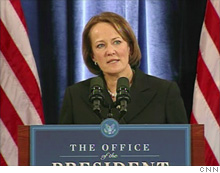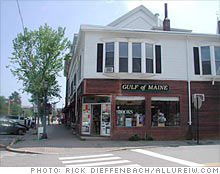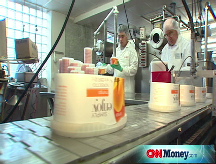The view from Maine Street
Tapped by Obama to run the Small Business Administration, Wall Street veteran Karen Mills will need to move quickly to unlock the cash and assistance needed by struggling businesses - including those in her own hometown.
 |
| Karen Mills, Obama's nominee to head the Small Business Administration |
 |
| Brunswick's Maine Street |
 |
| Small shops fill Maine Street, a popular destination for both tourists and local residents. |
 |
| Henry D'Alessandris at Oo La La, a shop he co-owns with Martin Perry. |
BRUNSWICK, MAINE (CNNMoney.com) -- In Brunswick, Maine, the road running through the center of the town is spelled like the state: Maine Street. It's quintessential New England, picturesque and steeped in history - and like so many other downtown districts around the country, Maine Street is filled with small businesses struggling to survive the ongoing recession. But Maine Street's business owners will soon be looking to one of their own for help, when local resident Karen Gordon Mills takes charge as the new head of the Small Business Administration.
Until President Barack Obama tapped her as his SBA pick, Mills was best known in Brunswick as the wife of the president of Bowdoin College, the town's Ivy-esque liberal arts institution. Most of Mills' business dealings took place 350 miles south, in New York City, where she co-founded the venture capital firm Solera Capital in 1999 with two partners. Mills remained a managing director at Solera until 2007, although a spokeswoman for the company says her final few years were in an advisory capacity.
A Harvard MBA grad, Mills has spent most of her career working with corporate giants and companies that aspire to become them. Owner of the private-equity firm MMP Group, which she founded in 1993 and now runs from her house in Brunswick, Mills has sat on the boards of directors for Scotts Miracle-Gro (SMG) and for Arrow Electronics (ARW, Fortune 500), a $15 billion semiconductor distributor.
But if Mills wants to hear about the concerns of family-run business owners, she need only pick up the phone: Her parents, Ellen and Melvin Gordon, have owned most of famed candy maker Tootsie Roll Industries (TR) for five decades. The company reported sales of $496 million last year.
"She is an extraordinary choice for head of the SBA," says Michael Porter, a Harvard Business School professor who has known Mills since she was a student. "Given her background, she knows more about entrepreneurship and business growth than any administrator in recent memory."
Mills will need all of her skills and resources to pull the SBA out of its quagmire. Eviscerated by budget and staffing cuts and weighed down by bureaucracy, the SBA hasn't been a powerful force in Washington for years - Bush stripped from its administrator the Cabinet-level status President Clinton had accorded. At a time when companies most need access to cash, small business loan volumes are way down, stalling startups and endangering existing businesses that need help surviving the recession. Want to know how bad it's gotten? Just talk to the businesses along Maine Street.
"If I were able to have a conversation with Karen, I'd like to hear her ideas, like what kind of incentives for small businesses [might become available] that would hit the local level," says Martin Perry, 51, co-owner of Brunswick's Oo La La card and gift shop.
Mills was a customer of the shop, but she won't be able to stop by much longer. Just this week, after a stretch of days with negligible sales, Perry and his business partner, Henry D'Alessandris, decided to close their store.
Perry and D'Alessandris, started, grew and sold two other small businesses, a lobster wharf and a restaurant, before opening Oo La La in 2005. D'Alessandris, 60, is also a chef, and has catered private parties for Mills, including her three sons' bar mitzvahs and a dinner with Senator Olympia Snowe, who backed Mills for the SBA job.
Like many proprietors in small towns across the country, Perry and D'Alessandris' have been struggling for months to keep their business afloat. They slashed payroll, cut back their inventory, and laid off their only employee. But that hasn't been enough.
"It's just been wicked slow, and I don't want to sit here for two more years before it gets better," D'Alessandris says. "I want to get out before worse gets worse."
Brunswick's economy was swamped when skyrocketing gas prices cut deep into prime tourist season this summer. Looming larger on the horizon is the scheduled closure of the Brunswick Naval Air Station in two years.
Richard Gnauck of Richard's, a German-American restaurant on Maine Street, fears the economic double-whammy of the recession and the base closure. "It's going to be a rough ride," he predicts. "You have to eat, but you don't have to go out to eat. That's one of the first things you cut."
Gnauck, 62, employs 13 people, including his two sons, who work in the kitchen. He owns his entire building and rents two upstairs apartments, often to people associated with the Navy. To conserve cash, Gnauck has put off large purchases and repairs. He may need to cut a shift from each employee to avoid layoffs.
"I can't go to the Senate and say I need a million dollars to pay off my mortgage," he says. "I just hope she can help us along, see the problems that small towns are having."
Former Maine Governor Angus King, a fellow Brunswick resident, believes Mills' experience on Wall Street and Maine Street will be invaluable at the SBA.
"I think she has a foot in both worlds, in the sense that she worked in New York in private equity and that kind of thing, but then the businesses they were investing in were 'Main Street' kinds of businesses, like Annie's Macaroni & Cheese," says King, citing one of Solera Capital's best-known investments, in the Annie's Homegrown line of organic pantry staples.
Mills, who is keeping a low profile until after her confirmation hearing, declined to be interviewed for this article. If her past work is indicative of her future policy plans, one likely area of attention is business clustering, an economic approach popularized by Mills' former Harvard professor, Michael Porter, and by recent Nobel laureate Paul Krugman.
Clustering advocates promoting geographic pockets of expertise, allowing related businesses to build up and draw upon a shared pool of labor, suppliers and intellectual capital. The best known example of clustering in the U.S. is Silicon Valley, the epicenter of the tech industry.
In April, Mills co-authored a report for the Brookings Institute promoting an expanded federal-government role in fostering regional economic clusters. Her report recommended a two-prong effort: First, create an information center to map, track and conduct research on cluster dynamics; and second, establish a financial grants program to support regional and state cluster initiative programs. The report estimated the annual costs of this plan at $360 million.
Mills has already had a chance to put theory into action. Both King and Porter say her work has been instrumental in boosting Maine's boat-building cluster, which secured a $15 million grant from the Department of Labor's WIRED program.
Mills is also experienced with one of the most daunting issues confronting many locales: Replacing extinct industries. A member of the advisory board for the Governor's Council for the Redevelopment of the Brunswick Naval Air Station, Mills has been an active participant in discussions about how to replace the local military base after it closes in 2011.
"She's a very thoughtful and insightful person," says Steve Levesque, executive director of the redevelopment organization, who sits on the state board with Mills and counts her as a confidant. A former small business owner who's had dealings with the SBA, Levesque is delighted with Mills' selection because of her hands-on business experience.
"Unlike a lot of political appointments, they picked a practitioner," he says.
But much of Mills' practical experience is in high finance and public policy, a point of contention for advocates of the smallest small businesses. Lloyd Chapman, president of the American Small Business League, a Washington lobbying group, views Mills' background as a red flag: "She's a multimillionaire venture capitalist from New York. That doesn't fit my definition of small business."
-
The Cheesecake Factory created smaller portions to survive the downturn. Play
-
A breeder of award-winning marijuana seeds is following the money and heading to the U.S. More
-
Most small businesses die within five years, but Amish businesses have a survival rate north of 90%. More
-
The 10 most popular franchise brands over the past decade -- and their failure rates. More
-
These firms are the last left in America making iconic products now in their twilight. More












